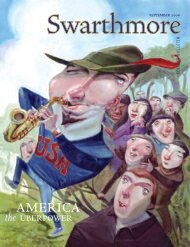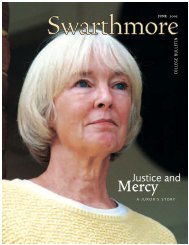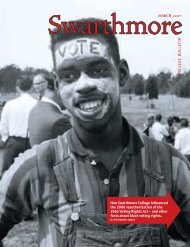Swarthmore College Bulletin (June 1998) - ITS
Swarthmore College Bulletin (June 1998) - ITS
Swarthmore College Bulletin (June 1998) - ITS
- No tags were found...
Create successful ePaper yourself
Turn your PDF publications into a flip-book with our unique Google optimized e-Paper software.
HOW DO YOULIVE AGOOD LIFE?Philosophy professor Richard Schuldenfrei has been asking<strong>Swarthmore</strong> students this question for 30 years.Richie Schuldenfrei is pacing. Hespeaks slowly, reminding hisclass where the discussionended last time, stretching out histhoughts, long and careful and quiet.“For a long time ... moral philosophy ...caught between Kant and Hume.”A student, tardy and knowing it,appears at the door and sits sheepishlyin a nearby chair. A few secondslater, another appears, tardy andknowing it and not caring, and sauntersto a seat in the front where hepulls a sandwich out of his bag. Richiedoesn’t look at them. In fact, he hasn’tlooked in the eyes of any of the studentsin the random semicircle ofchairs in 324 Papazian. He’s stillwarming up.He rolls up the sleeves of his navyblueshirt, hanging boxy over a wornpair of Levis. Still pacing. “The basicview ... virtue ethics ... what is rightand just.” He knows they remember.He knows they’re clear on virtueethics. He knows they understand thedifference between the theories ofKant and Hume, between a life drivenby duty and a life driven by comfort.He knows they’re prepared. He’s theone who needs to pace, who needs tofind the pace, the momentum. Especiallytoday, the third-to-last class ofthe semester. The school year, thestudents, are all winding down. Wearingout. So is Richie. And today it’sraining.He stops behind the podium. Heputs on his glasses, glances at hisnotes. He takes off his glasses, holdsthem in his left hand. He looks up,ready now, leaning forward farenough that the podium balances onone thin edge. Then, the question:“How do you live a good life?”The question.Richie Schuldenfrei has been asking<strong>Swarthmore</strong> students this questionfor 30 years. And for 30 years,he’s been asking himself as well.Schuldenfrei is not a philosopher.He just teaches philosophy. Atleast that’s what he says after class,sitting in his office, in his trademarkblack leather swivel chair, a chunk ofcardboard holding up one leg. A philosopher’schair. The place where for30 years he’s chatted and argued andcounseled students, backed by a walllined with Plato and Aristotle andLocke and Rousseau and Hegel andNeitzsche and Dewey and Kant andHume. “I have no answers,” he says.What Richie does have is a following.The senior class has selected himas the faculty speaker at Last Collectionfour times. Then there’s the list of58 alumni who consider Richie to betheir greatest <strong>Swarthmore</strong> influence.The list is impressive for its numberand its range—some who graduatedin the early ’70s and some who graduatedjust a few years ago.“I don’t think a week goes by whensomething in my professional interactionsdoesn’t get me thinking aboutRichie,” says Vishu Lingappa ’75, aphysiology professor at the Universityof California. “He constantly questionedhimself ... and us. I’ve taken onthis trait of his. I thrived on it. He and Iwould walk around campus and talkabout Hume or Hegel or something weBy Vicki Glembockiwere studying in class. An hour wouldgo by, us wandering around, arguing.”“He taught us what philosophyshould be,” says Noah Efron ’82, whoteaches history of science at MIT. “It’sa set of personal questions thatbecomes personal obsessions aboutthe way you live your life.”For Richie, philosophy is personal.Teaching it is personal. “I want toteach them something that they cantake away with them. I want to helpteach them something that’s going tomake a difference in their lives, notjust a little patch of knowledge thatthey’ll never have any reason to bringup to live memory in the future,” heexplains.Teaching students “somethingthat’s going to make a difference intheir lives.” The words ring with thesweet and noble naïveté of a youngprofessor, fresh out of grad school,but Richie never fit that picture. Hearrived at <strong>Swarthmore</strong> in 1966 a “reddiaperbaby with a radical disposition”—andwith a bachelor’s and master’sfrom Penn and a doctorate fromthe University of Pittsburgh.He says he fit right in with <strong>Swarthmore</strong>students then, when their tonewas what he describes as “an olderform of American radicalism, somethingbetween American populismand a classical sort of left-wing politics.”When politics came to the forein the late ’60s, Richie was drawn tothe radical side, “fumbling my way toexplicit Marxism.”“Every day students made connectionsbetween what they were learningin the classroom and what theywere hearing on the news,” says Bob10 SWARTHMORE COLLEGE BULLETIN
















